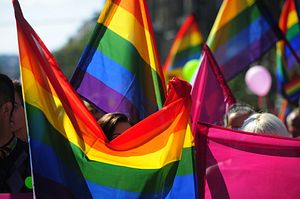News on LGBT rights in the post-Soviet sphere often ranges from the dispiriting to the dire. Between hooligans disrupting LGBT events in Kyrgyzstan to Russia’s unprecedented anti-gay “propaganda” legislation – to say nothing of the plight facing the blighted LGBT communities in Uzbekistan and Turkmenistan – the former Soviet republics present one of the treacherous regions extant for sexual minorities.
Kazakhstan, unfortunately, has proven just as susceptible to the LGBT rights backslide as its neighbors. A few months ago a Kazakhstani court forced an advertising agency to pay nearly $200,000 to 34 music students and teachers – all but bankrupting the agency while freezing the company’s assets – simply for publishing a poster showing Kazakh composer Kurmangazy Sagyrbayuly kissing Russian poet Alexander Pushkin. Homophobic rhetoric has also seen a decided uptick within Kazakhstan recently. One of the most prominent anti-gay activists, Dauren Babamuratov, recently noted that you can identify LGBT individuals by their “colored pants,” and called for a “blood test [to] show the presence of degeneratism in a person.”
In the legal sphere, Kazakhstani lawmakers are currently considering legislation mirroring Russia’s anti-gay “propaganda” law. While the legislation remains to be enacted, Amnesty International highlighted the bill’s myriad flaws: “[The bill] will expose LGBTI people to discrimination and violence based on stigmatization of their sexuality. Additionally, potentially over-broad references to ‘propaganda’ in the draft legislation may lead to restrictions on a wide range of speech and expression, in violation of international law.” In a separate post, Amnesty noted that the “law would also fuel anti-LGBT stigma, increasing the risk of homophobic and transphobic discrimination and violence.”
As lawmakers debate the bill, however, a new actor has presented a potential roadblock to enacting Central Asia’s latest round of legal backslide: the International Olympic Committee. Kazakhstan remains one of two candidates for the 2022 Winter Olympics, alongside Beijing. Considering how preoccupied Kazakhstan remains with cultivating its international image, the country has unsurprisingly devoted considerable energy to its nomination. Should Kazakhstan land the Games, the selection would present the largest international coup the country’s ever known.
However, its candidacy flies in the face of a recent update within the IOC’s Olympic charter. In December, the IOC amended the charter to include “an acknowledgement of sexual orientation protection … and included such protections in the host-city contract.” The move was widely lauded within the LGBT community, but “appears to directly conflict” with Kazakhstan’s recent move toward enacting a Russia-style crackdown on its LGBT community.
Athletes, however, have taken note. Over two dozen current and former athletes penned a letter earlier this month to IOC President Thomas Bach regarding Kazakhstan’s candidacy. Highlighting the letter’s signatories were diver Greg Louganis, tennis star Martina Navratilova, and soccer player Robbie Rogers, all organized by Athlete Ally.
The brief letter commends Bach’s move toward enshrining LGBT equality within the Olympic charter, and highlights the shortcomings within Kazakhstan’s candidacy:
“In light of Kazakhstan’s aspirations to host the 2022 Olympic Winter Games and their recent consideration of legislation prohibiting ‘propaganda of non-traditional sexual orientation,’ we urge the IOC to reiterate to Kazakh authorities that discrimination with regard to sexual orientation is incompatible with belonging to the Olympic movement.
“The IOC is in a unique position as the global leader in sport to communicate to the Kazakh authorities that no discriminatory legislation should be adopted or implemented.”
Considering the scant success human rights and LGBT activists have had in Central Asia over the past few years, and given the region’s overt willingness to mimic the legislation passed in Russia, this letter may well present the last, most feasible hope at stemming legalized homophobia in Kazakhstan. Astana has shown a susceptibility when its international image is at stake. And with the Olympic Games potentially offering a major boost to Astana’s credibility, both internationally and domestically, the letter may have located the correct mechanism for stemming the legislation.
Of course, it could also simply postpone the inevitable. But it’s better than nothing, and may help show what a little international ingenuity can pull off.

































